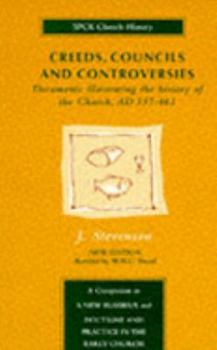Creeds, Councils & Controversies: Documents Illustrating the History of the Church AD 337-461
Select Format
Select Condition 
Book Overview
This sourcebook of primary texts illustrates the history of Christianity from Nicaea to St. Augustine and St. Patrick. It covers all major persons and topics in the "golden age" of Greek and Latin... This description may be from another edition of this product.
Format:Paperback
Language:English
ISBN:0281043272
ISBN13:9780281043279
Release Date:January 1989
Publisher:Society for Promoting Christian Knowledge
Length:432 Pages
Weight:1.30 lbs.
Dimensions:1.3" x 5.5" x 8.5"
Customer Reviews
2 ratings
Early Church students may appreciate a shock when reading the original texts
Published by Thriftbooks.com User , 17 years ago
"Having studied at Yale University under specialist in the History of Dogma, one may appreciate the shock this writer had.. when he saw in the minute's of Chalcedon... A discussion and agreement about the dangers of analogia entis, analogia fidei... may be a helpful and useful corollary..." Fr. John Romanides Church Creeds: Creeds are church doctrines summarizing the basic doctrines of faith, stating the formal confession of religious belief. The focal and basic creed is the Shema, as confirmed by Jesus Christ, "Hear O Israel, the Lord our God, the Lord is one;" First declarations of Christian faith was by Paul, "for us there is one God, the Father, from whom are all things and for whom we exist, and one Lord, Jesus Christ, through whom are all things and through whom we exist." 1 Cor. 8:6 Church councils: The Church held councils to resolve issues, when non Conclave dialogue failed to come to a consensus. Most councils were local, although in some cases their decrees gained wide acceptance. Non acceptance of major dogmatic themes nullify the council dogmatic decrees. The acceptance of the canons does not match within churches; while Roman Catholics regard them as binding (canonical,) only when a Pope has ratified them. Protestants recognize the authority of only the first four councils, canons of several councils have never been accepted by the reformation. As first expressed by Martin Luther, Protestants do not regard neither councils nor their canons as binding, unless they are in accordance with scripture. That is how the ancient Oriental churches only count the first three councils as ecumenical. Church Documents: This selection of documents on the fourth and fifth century, have been selected from an ocean of original texts by Dr. J. Stevenson, an expert on the subject. The great temptation for Early Church students is to confine their readings to secondary sources, in spite of the abundance of original texts, due to the 'multiplicity and complexity of sources,' in the editor's own words. The material, drawing on a wide range of sources, with valuable brief notes, tables, and a map indicating modern corresponding names, have been proof read by one of the most eminent scholars on the subject, professor WHC Frend.
Excellent Resource
Published by Thriftbooks.com User , 21 years ago
This book is an excellent source of information on the development of doctrine in the Catholic Church in the 4th and 5th centuries. If you are interested in the Patristic era, this book is a great resource to have.





